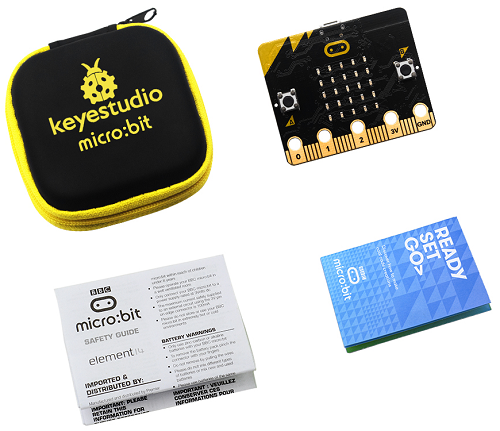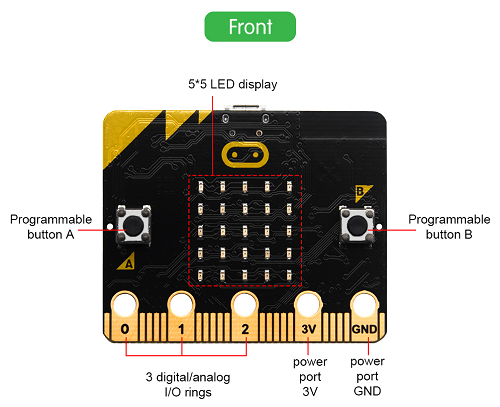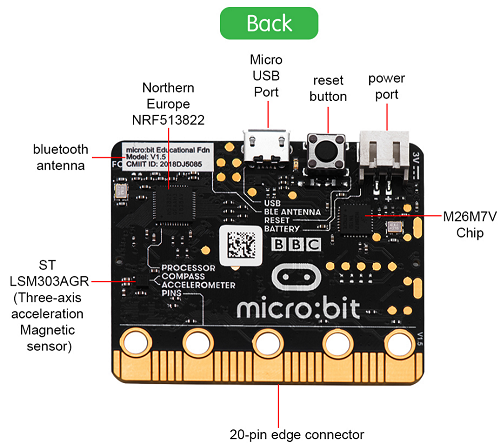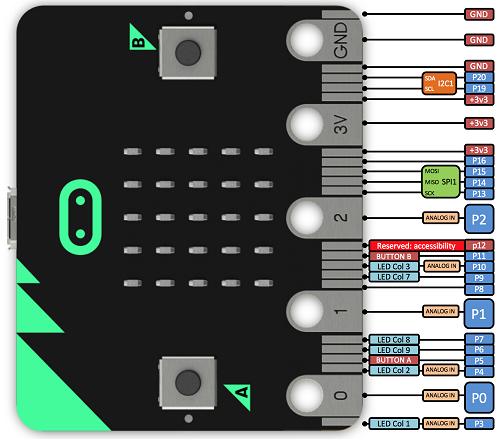KS0468 Keyestudio Storage Bag Micro:bit Main board Kit: Difference between revisions
Keyestudio (talk | contribs) |
Keyestudio (talk | contribs) |
||
| Line 83: | Line 83: | ||
https://fs.keyestudio.com/ | https://fs.keyestudio.com/KS0468 | ||
Latest revision as of 09:03, 27 April 2021
Description
Micro: bit is an ARM-based microcontroller designed by BBC. Consisting of onboard Bluetooth, accelerometer, electronic compass, three buttons, 5 x 5 LED dot matrix, it is only half the size of credit card and mainly used for programming education for teenagers. In order to carry it conveniently, we put a micro: bit control board and two manuals in storage bag. The storage bag is light and beautiful.
Parameters
- Working voltage: 3.3V
- Micro USB program burning / power supply port: 5V
- PH2.0 power interface: 3-3.3V
- Alligator clip interface: 3-3.3V
- Detection range: 0-3.3V
- Processor: ARM Cortex-M0 microprocessor
- Working temperature: 0-85 ℃
Interface Type:
- Micro USB program burning / power supply port
- PH2.0 3V power supply port
- 4mm crocodile clip interface * 5
- Gold Finger Interface * 20
- Size: 43 * 52mm
- Packing size: 105 * 55 * 30mm
- Weight: 8.6g
Features
- 1. Support PXT graphical programming interface developed by Microsoft
- 2. Support Windows, macos, ios, Android and other operating systems
- 3. The programming environment is based on WEB services, no need to download additional compilers
- 4. Burn and simulate program via USB on PC terminal
- 5. Wirelessly burn and simulate program on the mobile terminal via Bluetooth
- 6.Support multiple communication programming languages including javasript, python, mbed c
On board Resources
- 1. Nordic nRF51822 Bluetooth low energy chip: 16MHz ARM Cortex-M0, 256KB Flash, 16KB RAM
- 2. NXP KL26Z microcontroller: 48MHz ARM Cortex-M0 +, support USB2.0 OTG
- 3.ST LSM303AGR three-axis acceleration sensor and magnetic sensor
- 4. form a 5 * 5 matrix with 25 red LEDs
- 5, 3 mechanical buttons, 2 user buttons and 1 reset button included.
- 6. Micro USB power supply / download interface, power interface, 23pin gold finger signal interface, including SPI, PWM, I2C and support 17 GPIO
Pins Diagram
Pins Function
| GPIO | P0,P1,P2,P3,P4,P5,P6,P7,P8,P9,P10,P11,P12,P13,P14,P15,P16,P19,P20 |
|---|---|
| ADC/DAC | P0,P1,P2,P3,P4,P10 |
| I2C | P19(SCL),P20(SDA) |
| SPI | P13(SCK),P14(MISO),P15(MOSI) |
| PWM | P0,P1,P2,P3,P4,P10 |
| Occupied | P3(LED Col1),P4(LED Col2),
P5(BUTTON A),P6(LED Col9),P7(LED Col8),P9(LED Col7), P10(LED Col3),P11(Button B) |
Resources
micro:bit official website:http://microbit.org/
micro:bit Official chinese Website:http://microbit.org/zh-CN/
micro:bit programming code:http://microbit.org/zh-CN/code/
micro:bit ideas sharing:http://microbit.org/zh-CN/ideas/
micro:bit quick start guide:http://microbit.org/zh-CN/guide/
(recommend google chrome)
https://fs.keyestudio.com/KS0468
Difference between micro: bit and Arduino
| micro:bit | Arduino | |
|---|---|---|
| User group | Elementary school above | Senior student above |
| Processor | 32-bit ARM Cortex-M0 | 8-bit microcontroller ATmage328P |
| Size | 43mm*52mm | 53mm*69mm |
| Programming environment | online programming tool + local programming tool | local programming tool(Arduino IDE) |
| Programming language | Graphical programming;MicroPython; Scratch | C;C++ |
| Onboard components | I/O singal port;Bluetooth; accelerometer;
Electronic compass; button; LED dot matrix || I/O signal port;LED | |
| External device | Alligator clip; shield | Jumper wire, shield |
| Compatible voltage | 3V | 3V-5V |
Buy From
- [ Official website: ]
- [ Shop on aliexpress store]



